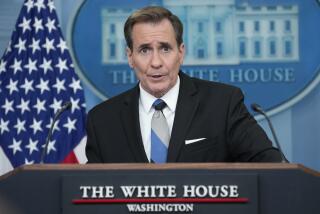U.S. High Tech for Soviets : Bush Wants Allies to Ease Restrictions
- Share via
WASHINGTON — The Bush Administration today proposed that Western allies substantially ease restrictions on selling advanced computers and other high technology to the Soviet Union and Eastern European nations.
The announcement, following pressure from the allies for liberalized trading rules, affects 43 categories of restricted items. Seventy-seven other items remain restricted.
The plan would seek more effective control--now complicated by the sheer number of goods on the list--over powerful computers and other products that could still prove a threat in Soviet hands.
“We think this helps us have a more realistic trade approach,” White House Press Secretary Marlin Fitzwater said.
“In effect, our proposals will build higher fences around fewer goods by focusing on those items that are the most sensitive in terms of our national security,” he said.
The action comes at a time when the Bush Administration has been trying to pressure Moscow to ease its economic blockade of Lithuania.
Asked if it were the proper time to liberalize high-tech trade with the Soviet Union, Fitzwater said, “You can’t link everything in the world.”
He said the proposal was endorsed by all of the intelligence agencies, as well as the Pentagon, State Department and others. He said some conservatives have tried to portray a division within the government on the matter, but he said that was not the case.
Fitzwater said 30 categories of products on the list of restricted goods and technologies would be eliminated and 13 would be substantially reduced.
Generally, the proposal would liberalize trade in computers, machine tools and telecommunications equipment.
Richard Barth of the National Security Council staff said the latest generation of personal computers would be removed from the control list, under Bush’s plan.
“The President’s proposals will continue to protect our advanced technology from being exported to the Soviet Union and other adversaries,” Fitzwater said.
“We will be able to pinpoint a streamlined list of exports that can make a major contribution to Soviet power, while changing the restrictions on items such as personal computers which are readily available throughout the world, anyway,” he said.
The sale of sensitive technology to Warsaw Pact countries, as well as China, has been restricted for more than 40 years under a process known as COCOM, the Paris-based Coordinating Committee for Multilateral Export Controls. Seventeen nations are members of COCOM.
The outgrowth of extensive study and internal debate, the proposals must be ratified by COCOM, through which NATO, Japan and Australia regulate high-tech trade with the Warsaw Pact and China.
Though the Pentagon has fought for a continued tight rein on technology the Soviet Union could use for strategic gain, Fitzwater insisted that the proposals had “the unanimous support of all security agencies.”
With some European members of COCOM favoring much more dramatic changes, an Administration official said “hard negotiations” could be in the offing as the U.S. proposals come under fire as insufficient.
More to Read
Sign up for Essential California
The most important California stories and recommendations in your inbox every morning.
You may occasionally receive promotional content from the Los Angeles Times.













